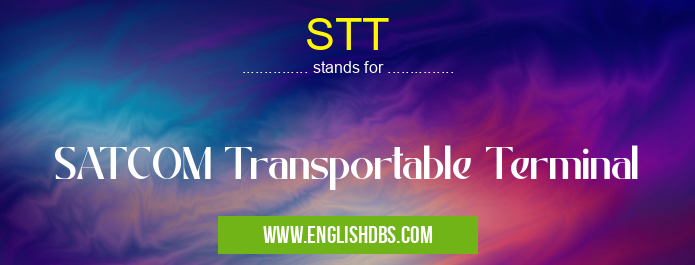What does STT mean in UNCLASSIFIED
STT stands for SATCOM Transportable Terminal. It is a self-contained, transportable satellite communications system designed to provide reliable and secure communications in remote or austere environments. STTs are typically used by military, government agencies, and non-governmental organizations (NGOs) to establish and maintain communications in areas where traditional infrastructure is unavailable or damaged.

STT meaning in Unclassified in Miscellaneous
STT mostly used in an acronym Unclassified in Category Miscellaneous that means SATCOM Transportable Terminal
Shorthand: STT,
Full Form: SATCOM Transportable Terminal
For more information of "SATCOM Transportable Terminal", see the section below.
Key Features
- Mobility: STTs are designed to be easily transported and deployed, allowing for rapid setup and operation in diverse locations.
- Satellite Communications: STTs utilize satellite links to provide voice, data, and video communication capabilities over long distances.
- Self-Sufficiency: STTs incorporate power generation, antenna systems, and communication equipment, making them independent of external infrastructure.
- Security: STTs often employ encryption and other security measures to protect sensitive communications.
- Scalability: STTs can be configured with different sizes and capabilities to meet specific mission requirements.
Applications
STTs are widely used in various applications, including:
- Disaster response and emergency communications
- Military operations and peacekeeping missions
- Remote area infrastructure support
- Humanitarian aid and development programs
- Scientific expeditions and research missions
Essential Questions and Answers on SATCOM Transportable Terminal in "MISCELLANEOUS»UNFILED"
What is a STT (SATCOM Transportable Terminal)?
A STT is a portable satellite communications system that enables secure, reliable communication in remote or disaster-stricken areas where traditional communication infrastructure is unavailable or compromised. It provides voice, data, and video transmission capabilities, allowing users to stay connected with headquarters and other remote locations.
What are the key components of a STT?
Typically, a STT comprises a satellite dish antenna, a transceiver unit, a modem, a power supply, and a user interface. The antenna receives and transmits satellite signals, while the transceiver unit modulates and demodulates the signals. The modem converts digital data into a form suitable for transmission over the satellite link.
How does a STT work?
A STT establishes a connection with a satellite in geostationary orbit. The antenna tracks the satellite and aligns itself accordingly, enabling the transmission and reception of signals. The transceiver unit converts the signals into an appropriate format for transmission over the satellite link, while the modem ensures efficient data transfer.
What are the advantages of using a STT?
STTs offer several advantages, including:
- Portability and Rapid Deployment: They can be easily transported and set up in remote locations, providing quick and reliable communication during emergencies or when traditional infrastructure is damaged.
- Secure Communications: STTs employ encryption and other security measures to protect sensitive data transmitted over satellite links.
- Wide Coverage: Satellite communication provides extensive coverage, allowing users to connect from even the most isolated areas.
- Reliable Connectivity: STTs are less susceptible to interference and outages compared to terrestrial networks, ensuring stable and uninterrupted communication.
What are the applications of STTs?
STTs are widely used in various applications, such as:
- Military operations and disaster response
- Emergency communication in remote areas
- Offshore and maritime operations
- Broadcasting and media coverage
- Humanitarian aid and development work
Final Words: STT (SATCOM Transportable Terminal) is an essential tool for providing reliable and secure communications in remote and challenging environments. Its mobility, self-sufficiency, and flexibility make it an invaluable asset for organizations and individuals operating in areas with limited or no traditional infrastructure. STTs continue to play a vital role in enabling effective communication and facilitating operations in diverse and often demanding situations.
STT also stands for: |
|
| All stands for STT |
